Naptár
2024. április 15–19.
2024. április 20.
Eötvös József Kárpát-medencei középiskolai szónokverseny
2024. április 24. – május 3.
Tovább...
1. 2023.
Abstracts in English
Studies
Tary, Blanka – Fejes, József Balázs – Hódi, Ágnes – Szenczi, Beáta – Vígh, Tibor
Suggestions for the development of text comprehension embedded in subjects - teaching reading strategies I.
The aim of this paper is to present a lesser-known and less commonly used option for text comprehension development in the national school context, namely the teaching of reading strategies, in order to provide guidance for classroom practice. The paper briefly defines reading strategies, analyses their teaching situation, describes the relationships between text types and forms and reading strategies, and discusses the importance of teaching them. It describes the relationship between text types and strategies, since the use of reading strategies may vary from text to text. It also describes the most common reading strategies, illustrated by examples, mainly in a practical context. Finally, it makes suggestions for the teaching of reading strategies. The reading strategies presented in this article are mainly related to printed texts, but a significant number of them can also be used during reading digital texts.
Ihász, Petra – Benyhe, András – Sáry, Gyula – Juhász, Zoltán – Navracsics, Judit
Visual word recognition patterns of Hungarian-English bilinguals
As part of a larger study, this paper investigates the brain event-related potential components (EKPs) of written word recognition in case of bilinguals. It illustrates what happens in the brain at the orthographic, phonological and semantic levels of word recognition with lexical decision test results. The research questions address the temporal aspects of the written versions of the two languages in the processes of visual word recognition and the role of phonology in word recognition. We tested 23 Hungarian-English bilinguals, all of whom have a C1 level of English and use English daily at work or school. Results show different processing patterns in the identification of meaningful words and meaningless letters in the parietal and occipital lobes in the early (150-200 ms) and late (200-250 ms) stages of the N170 EKP component, which is the initial stage of word recognition. This means that the decision on word similarity occurs around 200-250 ms after stimulus presentation, when orthographic-phonological processing takes place. At this stage, however, participants can only decide whether the sequence of letters on the screen is a word or not. The linguistic classification of the word is only done later.
Demeter, Gáborné
Research-based pedagogical methodology in reading instruction
A significant number of quality papers in the national and international literature are available about the historical and methodological aspects of reading instruction. In pedagogical practice, however, the usefulness of reading research findings is often not tangible Even though the practical application of the most recent scientific findings should prevent the development of reading problems. One of the aims of the study is to summarize the results of reading research for practical purposes and to collect the most important professional achievements. This can be the starting point for a comprehensive and preventive reading development concept from the preparatory phase in preschool to the development of reading comprehension. Another aim of the study is to introduce practising teachers to the interpretation of the results of reading research in an explicit way. In order to achieve this, the presentation of the reading research results primarily follows the aspect of applicability in pedagogical practice, and its summarizing suggestions are useful for teachers and the professional audience.
Workshop
Zs. Sejtes, Györgyi
Mother tongue education with digital tools
More than twenty years ago, the first computers appeared in Hungarian schools, and ten years later the internet began to take over. Since then, it has become clear that the new technology and the content require new methods and a new pedagogical approach. Today, public education has made it a priority to teach pupils how to use ICT and to prepare them to take advantage of the opportunities offered by the information society. The reasons are twofold. The first is that the educational use of ICT tools is based on the expectations of the labour market, generated by the ICT applications that have become standard there. The second is that analysis of the background questionnaires of the PISA survey has shown that students who use ICT tools in their learning process achieve a better score on the tests. The present study puts the topic of the title in a broader context, while providing Hungarian teachers with concrete ideas for ICT-enhanced classroom practice.
Tókos, Katalin
Knowledge sharing, peer learning in the courses of the Teach for Hungary Programme
From 2020, ELTE also participate in the Teach for Hungary Programme, where students mentor young pupils from disadvantaged regions in partner schools in Nógrád and Pest counties. In the spring semester of 2023, 250 mentoring students from 9 ELTE faculties in Budapest support more than 1000 primary school pupils. The students can take the preparatory course as optional, and from the next semester onwards, mentoring will be supplemented by a support seminar, where the actual mentoring experiences will be processed. Thanks to the heterogeneity of the students, both the preparatory and the support courses are based on the principle of learning from each other, mutual knowledge sharing, and sharing elements and practices that work well in mentoring, since it is not uncommon to find former peer helpers and students with experience in higher education mentoring among the candidates. In addition to outlining the key principles of course organisation, this paper seeks to interpret mentoring as a learning process. Then, based on a selection of pedagogical criteria, some of the practices which have been considered successful in mentoring and shared by students are presented and complemented by their reflections.














